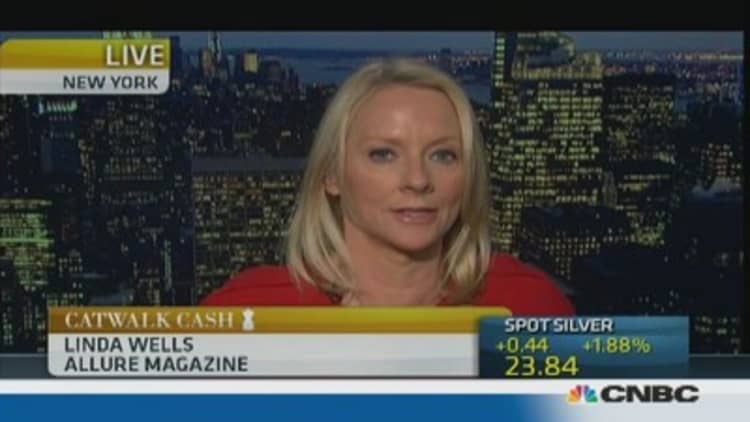For many brand devotees, simply wearing a designer's clothing or accessories just isn't enough.
To outfit these fans, more designers are expanding into cosmetics and fragrances to grow their lifestyle brands. In hopes of capitalizing on the run-up to fashion's biggest event, New York Fashion Week, many top designers, such as Marc Jacobs, Michael Kors and Jason Wu, recently debuted their lines in partnership with leading cosmetics companies.
"When you have these big runway shows, they get a lot of attention, and makeup now becomes a part of the whole imagery and the whole branding and then it draws the consumer back into the line," said Linda Wells, editor-in-chief at Allure magazine.
(Read more: L'Oreal CEO on Nestle deal: 'This is business fiction')
Since cosmetics are typically sold at more attainable prices, these lines also enable high-end designers to grow their consumer base, Wells added.
Emerging markets play
As China and emerging market customers have continued buying high-end brands, the $260 billion global luxury goods market has remained strong, with sales expected to grow by 7.9 percent this year, according Deutsche Bank.
(Read more: Cha-Ching! Retailers bring '90s fashions back)
"Cosmetics boost the awareness of a brand, especially in emerging markets because they are the first thing of luxury [that] emerging market consumers buy due to their cheaper price," said Nicola Ko, senior luxury analyst at Ledbury Research.
"You are building loyalty amongst emerging market consumers so when they do come into money and they are looking for high-end fashion, they know your brand," she added. "So in terms revenue it could be really big."
The overall U.S. beauty market is faring well, too. Total U.S. prestige sales, which include fragrance, makeup and skin care products sold mainly in department stores, climbed 7.8 percent last year, to $10.27 billion, according to market research firm NPD group.

Partnering with the experts
Many of the designers are teaming up with leading cosmetics houses, who already have decades of experience in the arena.
In her first foray into the beauty world, designer Tory Burch signed a multi-year agreement with a division of Estée Lauder for the license of Burch's fragrance business. Her first scent, scheduled to launch Sept. 26, will be exclusive to Bloomingdale's, Holt Renfrew and Tory Burch's boutiques and website. The debut also includes a cosmetics line and bath-and-body products.
These lines can be highly lucrative for designers because of high margins. In fact, industry sources estimate that Burch's beauty sales could hit $50 million in the first year, Women's World Daily reported.
Marc Jacobs' first cosmetics line, which launched in August, is produced in partnership with LVMH's Sephora unit. Coty owns the license to Jacobs' fragrance line. Meanwhile, L'Oréal produces Armani's makeup.
Wu has also chosen to collaborate with another company, Lancôme, for a limited-edition cosmetics collection that debuted at Nordstrom and select Bergdorf Goodmans in time for Fashion Week. Estée Lauder has the license for Michael Kors' fragrances. The designer launched three new fragrance and beauty collections in mid-August.
For fashion designers, partnerships with experienced companies are crucial to making a splash in the cosmetics market, said Silvia Rindone, a retail analyst at Deloitte.
"When you have established strong fashion brands that have a clear identity and positioning within the industry, then pair it up with a cosmetics brand that knows its stuff, it is a very powerful partnership and could enhance the brand," Rindone said.
(Read more: Michael Kors beats estimates; expects sales to soar)
Luxury cosmetics brands have been posting strong growth in recent years. L'Oréal reported a 7.7-percent year-over-year increase in first-half operating profits for 2013. Sephora will help parent LVMH's Selective Retailing unit overtake fashion and leather as its biggest business by 2018, according to research by Bernstein.
It is no surprise that fashion designers are looking to jump on this trend, and while this may not radically alter the market structure of the cosmetics industry, it will "shake things up," according to Neil Saunders, retail analyst at Conlumino.
"The big beauty brands will have to work harder to maintain the market because it's their market to lose and if these major fashion players nibble away at the edges, it has a diluting effect on the market share these cosmetic companies have," Saunders added.
—By CNBC's Arjun Kharpal and Katie Little

